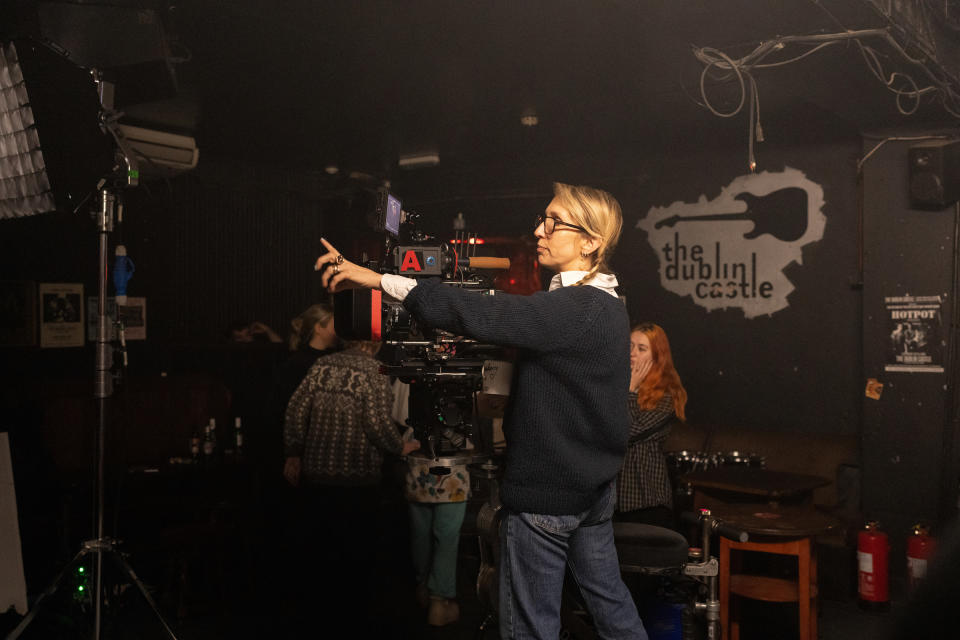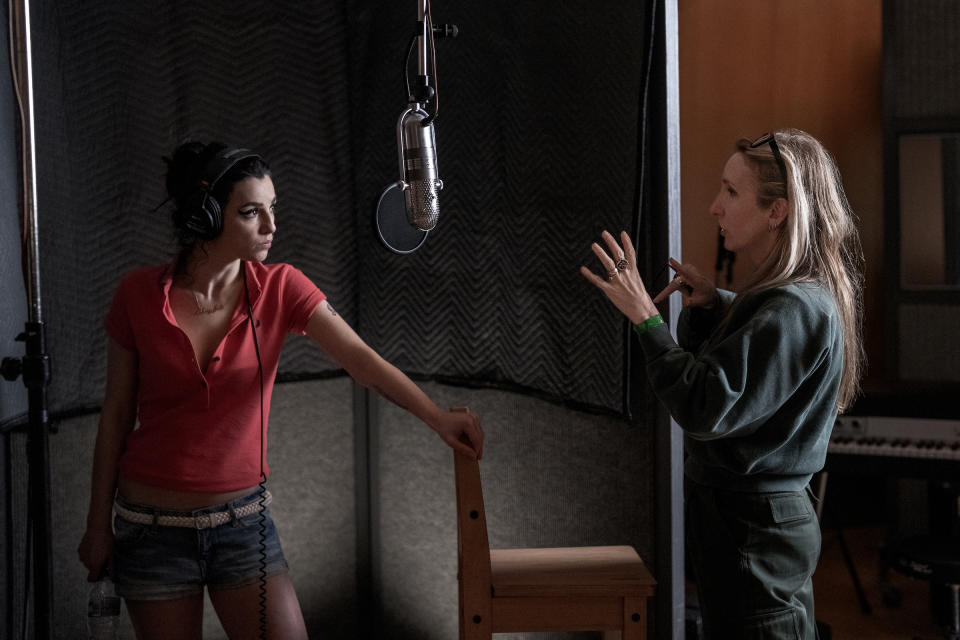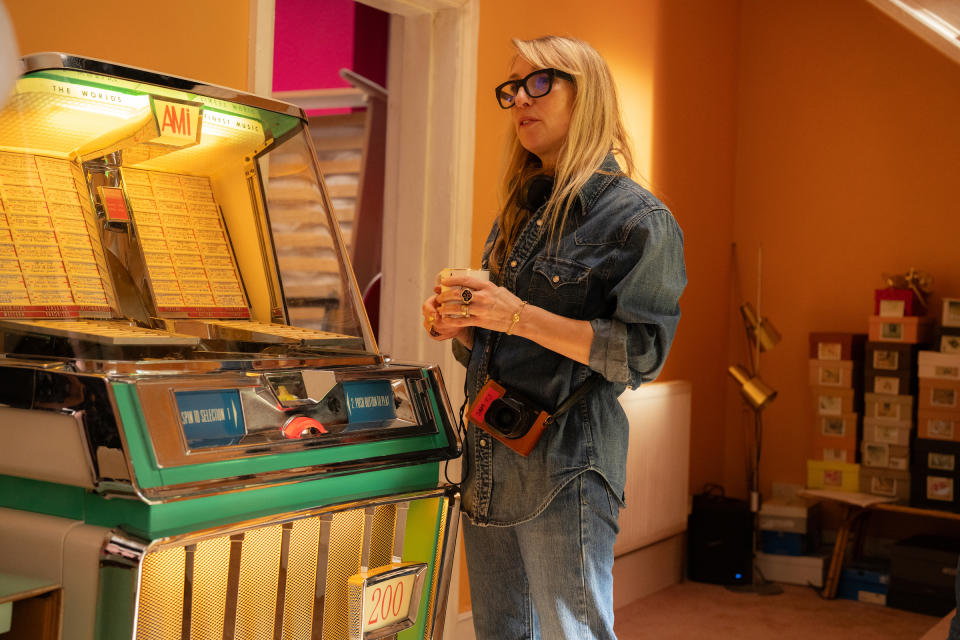Sam Taylor-Johnson on 'Back to Black' and Her Dream Gig

- Oops!Something went wrong.Please try again later.
- Oops!Something went wrong.Please try again later.
<i>Back to Black</i> director Sam Taylor-Johnson in New York City on May 14, 2024. Credit - Evelyn Freja for TIME
The British director Sam Taylor-Johnson has taken on some ambitious characters in her films. Some of them (John Lennon in Nowhere Boy) were real, some of them (Christian Grey, the tortured bondage enthusiast in Fifty Shades of Grey) were fictional, and at least one of them (James Frey, the author of the not entirely truthful addiction memoir A Million Little Pieces) were somewhere in between.
But her latest subject may be her most formidable. It's the singer Amy Winehouse, who died of alcohol poisoning at 27 in 2011, after recording one the era's most iconic albums, Back to Black.
Like Winehouse, Taylor-Johnson, who is now 57, got famous young, as a fine art photographer winning awards and attention for work that was highly personal. Her most famous images are self-portraits suspended apparently in mid-air and photographs of men crying. And like Winehouse, her private life has been the subject of tabloid speculation, especially since she married Aaron Taylor-Johnson, 33, who played Nowhere Boy's Lennon as a rebellious teen and who is, more recently, rumored to be in consideration to play the next James Bond.
The director, whose new film hits U.S. theaters today, has learned to tune it all out. As she says, "There are times when I feel the lens of the gaze and people's judgement but I just have to very quickly switch it off." Over a late lunch in Manhattan, Taylor-Johnson, who is cheery and forthright in person, talks about why she made Back to Black (her last biopic, she swears), why she never reads any press, and her campaign to direct the next Bond film.
This interview has been condensed and edited for clarity.
TIME: Back to Black opens with an announcer saying "This is Amy Winehouse." But the audience knows who the movie’s about. Why did you start with that?
Taylor-Johnson: I needed that at the beginning, in order to start with the magnitude of who she was, who she became. And then I could go into where she was, as a teenage girl, with the dreams and aspirations of what she wanted to become.
The film is not as celebratory as people might expect. A lot of people think her death is her husband’s fault or her dad's fault, but the film seems to suggest Amy was responsible for her own life, and wanted to be responsible for it. Is that what you were going for?
It's important to feel like we're celebrating her. But at the same time, it's important to show the complexity and make her a fully rounded human being with her own agency, because I've felt like a lot of her had been lost along the way. She wasn't just a victim of her tragedy. The music and the songwriting and the Ivor Novello awards and the Grammys, those achievements were being lost.
You’ve done two movies about people struggling with addiction: A Million Little Pieces and Back to Black. Do you have any insights into the condition?
It wasn't until halfway into filming that I made the correlation between A Million Little Pieces and this. I don’t necessarily have insights into how to fix the problem. But I definitely want to shed some light and understanding, to emotionally connect to the problem. In Amy's case, it was such a public crisis. You know, we have Alcoholics Anonymous and Narcotics Anonymous, but she was never afforded anonymity. I went to an exercise class this morning—I was up super early with jet lag—and on the way back to my hotel, there was a guy walking towards me and his knees were buckling, his eyes were rolling back and he put his arms open as he very slowly staggered towards me. For Amy, it was so much like that—her arms were outstretched, and it was just documented and documented as her knees buckled and she fell. It was just tabloid fodder. And we all just watched it in real time. In telling that story, I wanted to address that, so people had an awareness of what that meant.

Do you think that that perhaps Amy suffered from a mental illness?
I don't want to make statements and assume and label. What I decided to do was to look at her through her words and the stories she's telling. Within her songs she talks about her struggles with alcohol, she talks about her love addiction, talks about things like that. But there's also an awareness around the fact that she had bulimia from a very young age. I wanted everything to be through her perspective rather than mine, to come back to the intimacy of the connection of her and her music and what she was telling us. Otherwise I was in danger of repeating what has happened to her through her life and since her death—everything is dissected and picked apart from a voyeuristic place. I felt like her death is so sort of fetishized over, that she'd lost any sort of agency in terms of who she was as a woman, as a singer, songwriter, and the brilliance of her.
At one point a movie she says she can't just record music; she needs to 'live' her songs. I wonder if you feel that that's true of all artists or is that just particular to some?
It's particular probably to some artists who live a very authentic truth. [Producer] Mark Ronson told me a story of when she came to record Back to Black, how he would suggest a word change in order to fit with the structure of whatever music. And he said she looked, just completely, "What are you talking about? I cannot change a single word because that is a word that came from me." He said it wasn't even a crushing word, just like a tiny change to make a word land on the beat. I don't know that everyone works and lives by the sense of authenticity to themselves and having to live every single moment. For sure, the great ones quite often do.
Is it that sadness propels artists to create or does the act of creating take so much out of them that they're sad?
I don't know. It's so hard to answer. It could be both. I know from my own perspective of creativity, it's like a sense of having to. Not like, "I wonder if I'd like to exercise." If I'm not being creative, then I definitely don't feel balanced. When I then make a film, it's so all-consuming, and it takes and feeds, in sometimes equal measures, and sometimes it's completely out of balance. Especially with something like this, there are times where I just felt so drained. It's hard when you're dealing with incredibly intense emotional scenes, trying to fathom, you know, what it takes from you. And what you need and the place you need to go to properly portray those really difficult moments.
What's the role of the canary in the film?
That came from Janice, Amy's mom. She said, "Amy had this Canary called Ava. And she called me one day, absolutely distraught, saying, 'Mom, I think my canary is dead, can you come over?' And I went over, and it was indeed dead." And she said, "We had to put it in a sunglasses case, and drive to the cemetery, and do a proper burial, and stand there and say prayers, and she sang a song. Very serious." The way that she told it just felt so meaningful, and I thought, well, the analogy and the metaphor of that isn't lost—this little fragile songbird. And the meaning of it to Amy. And then for an entire week afterwards I saw canaries everywhere I went, and I was like "OK, I’ve got it! I’m going to put the canary in the picture!"
Before the movie was there an Amy song that resonated with you?
"Love is a Losing Game." She performed it at the Mercury Prize, after everyone had been very sort of publicly aware of her struggles with addiction, and then she became sober. I remember thinking she was incredible. We'd all watched her go through the pain and the heartbreak and the loss of her husband, and they’ve broken up and they've separated and now she's singing it to us as if we know nothing in a really intimate and painful way.

You were a young art star, she was a young pop star, you got a big art prize quite young, and rose quickly in a field where there are not many women who reached that level. Do you see overlaps with Amy?
Not at all, weirdly, because I never would have felt that level of fame. I didn't go back to collect my prize, because I just had [my daughter] Angelica. So as soon as the acclaim happened, my attention was shot from that world straight into a small child. And then I got ill very quickly after that. I never felt like it was the same level of anything that she had to deal with. Although I understand it, in a sense that I've had my own kind of sense of paparazzi. Even one person photographing you, makes you think, "Oh, sh-t, I shouldn't have worn this." You know, it makes you feel vulnerable. I do understand many aspects of it. I've had smaller doses, homeopathic doses.
Do you mean that because you are in what many people consider an atypical marriage, people are more interested?
I guess. I know it's there. People tell me, and there are times where it's crossed my visual path. And then, it kind of shocks me. But day to day is spent with Aaron and the kids and connected with school runs so I don't really think about it.
You don’t read anything in the press?
I don't read anything. I don't read reviews because I think one word is going to upset me and keep me awake at night. And I'm going to want to answer them and say, "Well, the reason I did that was because..." It's totally where madness lies. The thing is I live my life fairly fearlessly. I literally leap into every challenge with excitement. And I think if I read and took note of any of that I wouldn't be doing the amazing things I think I'm doing. I wouldn't make this film. I wouldn't have been in this amazing relationship for nearly 15 years. Everyone at the beginning said, "It's a terrible idea, it's not gonna work," and then you're like 15 years down the road and have raised four kids and you're like, "Really?" There are times when I feel the lens of the gaze and people's judgement but I just have to very quickly switch it off. It inhibits the fun in life. I would never have made this film if I thought about everyone panicking and thinking I'm gonna glorify her death. I know what I'm doing, I have to just do it.
There are two films out at the moment about older women married to younger men. Is that a subject that interests you?
Not at all. I think Aaron would say the same. Neither of us look at each other in that way. It's just a connection of souls and hearts and our life is our life where we're just moving through it in a gorgeous loving way. When people make films, or talk about it or question it or dissect it, it is so strange to me. When people fall in love, they fall in love.
What did you learn from making Fifty Shades of Grey?
It's one of those cheesy cliches that you get on a bumper sticker. I learned a lot from the brutal experiences that was. One of the biggest lessons was not to compromise creatively. Every single day was a fight to not compromise a vision. And most days losing, you know, and having to get up the next day and go in ready for the fight. After that, I was so depleted that it took me four years to make another film. You know, it's great that it did well. But for me, the experience of it was really challenging. I did A Million Little Pieces in 21 days on a $3 million budget, which was very difficult. But I had total creative freedom. And it was such a joy.
How did you enjoy The Fall Guy?
I haven't seen it. Aaron has this real funny thing about watching the movies that he's in.
He plays a big star in a movie directed by a woman. Did he come to you and say how do feckless male stars behave around women directors?
I think he knows. I tell him loads of stories all the time.
Do you generally discuss your work?
We both have opinions on each other's creative projects, I guess. I'm always asking him like, "What's this director like? How do they handle this?" One particular director he worked with, I said, "What's he like when he comes to you?" And he said, "Oh, he doesn't talk to the actors.” And I was like "What do you mean, he doesn't talk to the actors?!?" I love hearing all the other director stories.
How do you feel about the rumors that Aaron will be the next Bond?
I know nothing. But I would be so happy for him if that happens. I think it'd be fun. But then I'd like to direct it. Wouldn’t that be amazing? There's a moment in Grey's Anatomy, which I only started six months ago, when Meredith stands in front of the guy. And she says, "See me. Choose me." And I feel like I'm constantly doing that in front of Barbara [Broccoli, co-owner of the Bond franchise]: See me, choose me, see me, choose me.

What's next for you?
I'll be doing that thing of having anxiety: "What should I be doing? Nothing. I should be doing nothing." That's not in my nature. I'm anxious and it's gonna feel like free fall. That's what it normally feels like: an open void of nothingness and regular life. Where's the chaos?
Would you like to go back to doing fine art?
I never stopped, really. I had an exhibition in Rome last year. My brain’s never not thinking in that way. I just don't have the time in the same way, which then makes people slightly suspicious. And I don't have a gallery so that makes things a bit more uncomfortable. Because also, I don't want to go with my portfolio to a gallery and say: "Hey, by the way, I am still making art."
You had this big moment in the art world. You had a baby and then you got sick. Did that close brush with the extremes of life and death at the same time affect your work?
Yeah, it can't not affect every aspect of who you are. I think it completely shattered me down to nothing from which I had to figure out how to rebuild myself and then it shattered me down to less than nothing the second time around, because the first time you can rationalize in a way that lets you sleep at night. The first time I just didn't process it that much. I just had a mission to get through it. I was 29 when I had bowel cancer. The second time, when I had breast cancer, I sat down and thought, what has not changed? What have I not done? Why is this happening twice? What have I got to do? I went through this whole process of re-examining every fraction of my being in order to figure out how to never f-cking deal with this in my life again. It's so hard to explain emotionally, what you go through. Angelica was six months old the first time and three years old the second. And it was just that thing of, how do I get through this and live?
Is that what contributed to your fearlessness?
I'm fearless in work, but put me in front of a doctor or hospital doors, I'm a quivering wreck. I will cancel every appointment. Aaron takes me to every hospital check-up and I literally have tried throwing myself from a moving car. And I've canceled them, and he's got there, and he's like, "They said it's canceled," and I'm like, "Yeah? Should we go home?" He's like "No, I've managed to squeeze you in," and I'm like "What? No!"
Contact us at letters@time.com.

